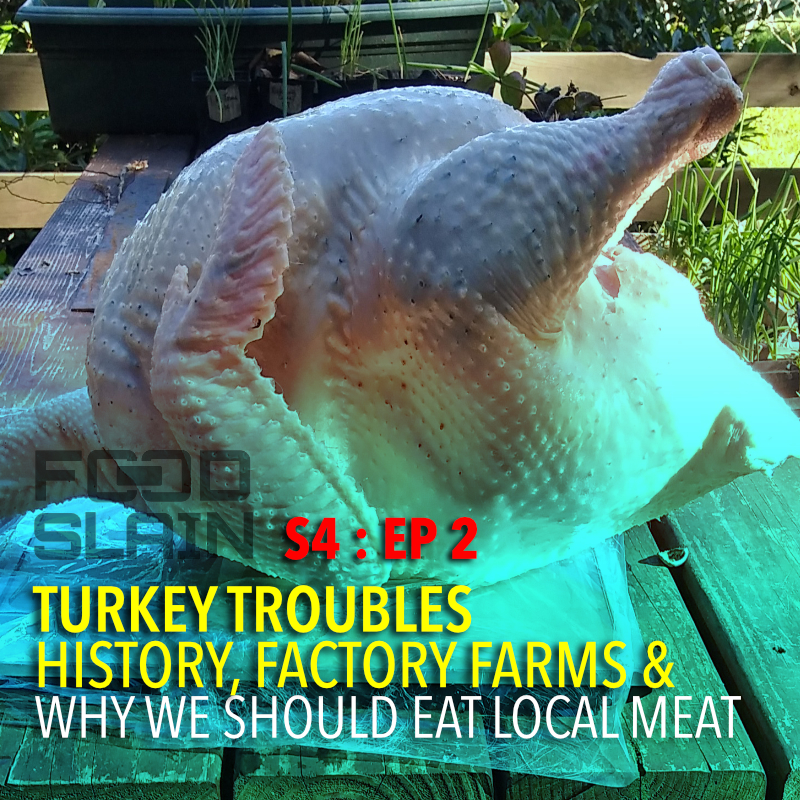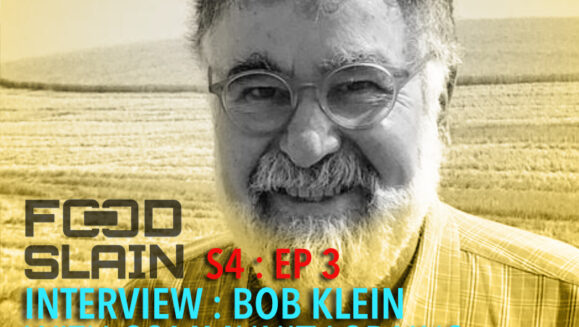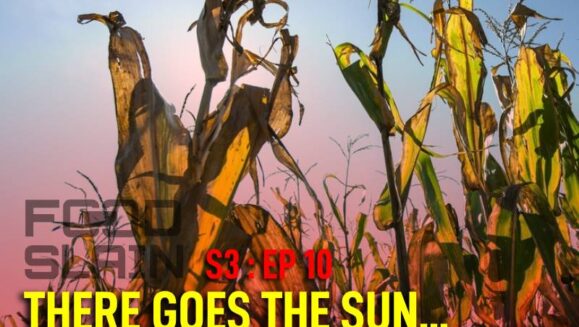In this episode we’re talking about turkey…
It’s Thanksgiving next week and I figured I should share a few little facts about turkeys, a little bit about the history of the original Thanksgiving meal and maybe give you a few reasons why you might want to consider eating local meat and supporting a small farmer where you live and get close to your holiday food.
But first…of course, THANK YOU. It’s been a wild ride this year. With so many distractions throughout the year, I really appreciate you listening into these episodes – this is episode #40 y’all. I realize that sometimes the toxic, dirty and inhumane side of food can be difficult to hear week after week, but if you listen to this podcast because you want to know the truth about your food, or you want to hear a different perspective on food than what the mainstream media and corporations are telling you or marketing to you…or you happen to be the one to piss your mother off at the dinner table at Thanksgiving dinner because you start talking about GMO’s, potassium bromate or atrazine in the food, then I’m glad you’re here and thank you.
So, I have a funny story…mom, if you’re listening…shout out to you.
I remember when I started digging into the food supply chain, I didn’t realize then what I was preparing myself for. It was 1991 and it was Thanksgiving. My mother wanted me to come home for dinner – my family get-togethers are HUGE and they are a big deal. Of course, there’s lots of food, all my aunties, uncles, cousins and even family friends would all get together for a big dinner, and I mean a big dinner. Turkey, ham, mac-n-cheese (oh, my aunts make the best mac-n-cheese), sweet potato casserole (you know the one with the marshmallows on top), cranberry sauce, gravy, stuffing, cooked to death green beans and of course…pies, cakes and bread galore. Shout out to all my very talented family home cooks.
Anyway, when my mother called me to tell me whose house dinner would be at, I told her that I wouldn’t be coming to dinner this year. The silence on the phone was deafening. I could tell, she was upset, maybe a little confused, but she wanted to get more information before she launched into me…
So she just said one word….why? Oh….and that was the perfect question.
So of course, I went on my little diatribe about how there’s no nutrition on the table, no vegetables, everything is cooked to death, too much sugar, the food is unhealthy, blah, blah, blah…she didn’t want to hear it and she was pissed. I’m sure she talked smack about me the entire evening when someone asked, “where’s Michele?”. I didn’t care…because here’s the thing.
There is no consequence for speaking up, if what you’re saying is true.
For years I’ve been speaking up – with much backlash and many consequences. Still to this day, when I call people on their ish, many of them act like cowards and try to justify their behavior and choices without taking responsibility for what they do and how they act. Just doesn’t work for me. And if you saw my most recent video on why I talk dirty about food…you’ll know that my #1 reason is, I don’t like liars. Anyway, you can check that video out on YouTube. I appreciate in advance if you like the video and subscribe to my channel while you’re there.
Anyway, the moral of the story here is, stand up for yourself if you know what you’re saying is true.
These days, and I’m pretty sure that no one in my family has ever admitted it to my face, but I know that my consistent digging and doing when it comes to healthy food for all these years, has impacted them in a good way. Big shout out to my mother, because she gets a lot of her vegetables at her local farmer’s market instead of the grocery store now. Anyway…don’t piss your mother off at the dinner table this Thanksgiving.
Okay, so let’s dive in and talk a little bit about history. Historically, the first “Thanksgiving” meal was in 1620, when the Pilgrims from Europe landed in what is now called Plymoth, MA, where the Mashpee Wampanoag tribe was settled – and had been settled for thousands of years before their arrival.
This year, 2020, marks the 400th anniversary of the Pilgrims arrival on the Mayflower.
And it also marks the first, what we now call, “Thanksgiving”…well, if we’re being intellectually and historically honest here, it was the first meal that the Mashpee tribe shared with the European settlers – even after the settlers brought yellow fever to the tribe in 1616 that wiped out ⅔ of the tribe…
But this meal didn’t have cranberry sauce or sweet potato marshmallow casserole but back then, the turkeys were wild turkeys, turkeys we know as heritage turkeys. There was no commercial turkey market then. Since then, Thanksgiving has become a holiday about food and indulgence. It’s a holiday we celebrate with family and friends and then we eat turkey casserole and turkey sandwiches for a week and shop til we drop the next day. But I digress.
So, this brings us to where we are now. Back in the 70’s, turkey was primarily eaten at Thanksgiving. Now, it’s eaten year round – as ground and lunch or sandwich meat. And we eat a lot of turkey. At Thanksgiving alone, we consume about 46 million turkeys. Then at Christmas, we consume another 22 million turkeys and then at Easter, we consume another 19 million turkeys.
So, in one year, we consume 87 million turkeys!
The average weight of a female turkey hen is 15 pounds and the toms, male turkeys, can get as big as 80 pounds but most of the toms raised for meat are about 30 pounds. So, if we do the math….the average weight of a turkey is 22 pounds. If we multiply that by 87 million turkeys…almost 2 billion pounds. aWell, to be precise, it’s 1,914,000,000 of turkey we eat every year. I know that’s a big number to visualize in turkey meat. That’s more than the entire Palace of the Parliament in Bucharest Romania weighs.
So, with that many turkeys being produced for our consumption….some things will inevitably go wrong…for the turkey.
In 2011, Mercy for Animals produced a PETA style undercover documentary about the treatment of turkeys at a Butterball facility in Hoke County, NC. You can check it out on their website or on YouTube, and let me warn you…like most animal welfare exposés, it’s hard to watch. I mean, it was hard to just read the article. The investigation exposed treatment so egregious that it led to the first ever felony animal cruelty conviction. An historic win for the turkey.
Beyond the terrible treatment turkeys endure at the hands of what seem like angry, underpaid factory workers, for years, turkeys have been fed GMO feed that also contained antibiotics and arsenic from a product called 3-Nitro aka Roxarsone which is, and I quote:
Roxarsone is an organoarsenic compound that has been used in poultry production as a feed additive to increase weight gain and improve feed efficiency, and as a coccidiostat. As of June 2011, it was approved for chicken feed in the United States, Canada, Australia, and 12 other countries. The drug was also approved in the United States and elsewhere for use in pigs.
Its use in the United States was voluntarily ended by the manufacturers in June 2011 and has been illegal since 2013. Its use was immediately suspended in Malaysia. It was banned in Canada in August 2011. In Australia, its use in chicken feed was discontinued in 2012. Roxarsone has been banned in the European Union since 1999.
Though this additive has been discontinued, many commercially produced turkeys are pre-brined in a salt solution (sometimes oil, flavorings and other additives) and then packaged.
And I urge you, not to believe the marketing hype on turkeys labeled with “natural”, “free range” and “sustainable” claims.
There is currently no standard definition for sustainable. Free range only requires producers to give animals very minimal access to the outdoors and natural, well that could mean just about anything – in most cases, natural flavorings are allowed.
So…there are some terrible things happening to turkeys before they reach your plate…the truth in the matter is, people don’t want to put up with this behavior from corporate factory farms knowing that their food is being treated inhumanely. People don’t want to eat food that has eaten food filled with chemicals and additives that compromise not just the health and well being of the animal, but of those of us consuming them.
People don’t want their food eating GMO’s and other animal mashups – and who knows what or turkey meat that is pumped full of arsenic and antibiotics. People don’t want to support companies like Butterball…and rightfully so. The advantage of course is the fact that you can get a commercially produced turkey for $3 a pound or less.
I get it…but the market is changing. The people are voting with their dollars.
This year, I raised turkeys for my local community and sold them all because people want to know where their food is coming from. People want to support local farmers who are compassionate and provide a good, happy honest life for their animals. People want to know that there are no chemicals, additives, flavorings and other BS injected into their food – and they are willing to pay a premium for that.
So, thanks to all of my customers who supported my efforts this year. I really appreciate it. It was an amazing, humbling, and eye opening experience. Turkeys are really wonderful animals. They are curious, funny and are by far, much more exciting to raise than chickens, in my opinion.
But this brings me to the point here. We can vote with our dollars. We can support local farmers where we live. We can help create local economies and keep the money circulating in the community. We can help create local food supply chains that are not wrought with bad behavior, bad actors, greed and toxic by products. We can. And I know many people who do. Shout out to all the wonderful turkey farmers out there who are doing the work for the good. This year, turkey farmers are taking a little bit of a hit because demand for large turkeys is down across the board, thanks to “the rona”.
Anyway, that’s where I’m going to leave this one, but before I go, I want to give a special shout out to one of my Patreon supporters – who is also a millennial, who I interviewed a while back to talk about food sovereignty. His name is West and his girlfriend May, purchased a turkey from me and not only that, they came to the farm to participate in the process of culling their own turkey…hands on! They are fully committed…and I interviewed them again and will be releasing the BONUS episode next week so that you can hear about their experience. So make sure to tune into that episode.
They are amazing…as are all my patrons and supporters.
I truly appreciate you all and wish you a very happy healthy holiday with clean, local food on your plates. Thank you.
Make sure to tune in next week because I am interviewing Bob Klein, the founder of Community Grains in Oakland, Ca. If you remember my episode on whole wheat and whole grains with Dr. David Killilea and his research in partnership with Community Grains, well, I finally got the interview and it’s a really great episode.
Alrighty…this concludes episode 40! I can’t believe it…but here we are…and we’re going to keep going until these companies stop giving us something to talk about. Let me know your thoughts. I love hearing from you on the socials. Thank you for leaving comments on the videos. Thanks for being connected on IG, FB and Twitter. Share this episode with someone you love. Hug your local farmer – because raising clean food is a lot of work, but it’s worth every sleepless night and poop slung on the face that goes into raising animals. True story…but that’s for another day.
Anyway…I love you guys…all over the world. Ireland, Puerto Rico, Lebanon, Switzerland, The Netherlands, Canada, the UK, Belgium, Malaysia, Mexico, Germany, Australia, The West Indies, Vietnam, and All over the US. Thank you so much for listening in…and remember to eat clean, eat healthy and love your food. When you love your food, you love yourself. And I’ll see you on the other side of the plate. Chow.



